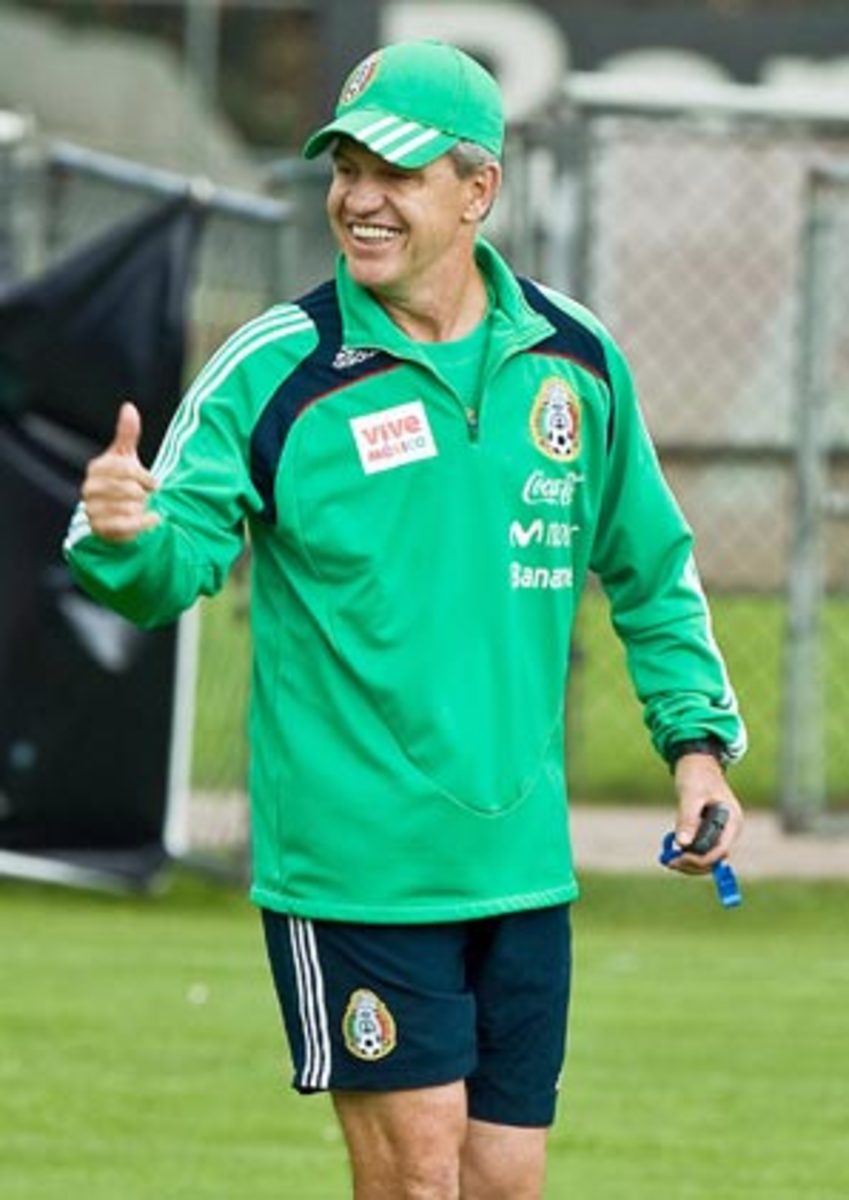Leadership, consistency key for Aguirre in return as Mexican coach
Perhaps the biggest difference between then and now is that Javier Aguirre has coached the Mexican national team before. Unlike Sven-Göran Eriksson, he knew plenty about the country and the Mexican league before he took over in April as manager for a second time.
Aguirre will jump into the fire quickly, as anything short of four points could be troublesome. If Mexico fails to beat either El Salvador on Saturday or Trinidad and Tobago next Wednesday, the finger will be pressed firmly on the panic button.
But there is hope. Aguirre is an accomplished coach who already pulled Mexico out of the abyss once. The roster is talented and focused, and players are fully aware of the stakes. There are some things, though, Aguirre should keep in mind to help smooth the transition into his upcoming matches.
Forget the hype; respect the statistics. José de Jesús Corona was a better goalkeeper than Guillermo Ochoa during the Clausura 2009 season. Tecos qualified for the Mexican league playoffs on the strength of Corona's goalkeeping, as he rescued his club many times. Ochoa's América squad failed to win a home game until the final week of the season, and by then it was too late to reach the playoffs. Ochoa's goalkeeping wasn't the only problem América faced, but it certainly wasn't a bright spot.
Perhaps Aguirre realized the uncertainty of the position by bringing in 36-year-old World Cup veteran Óscar Pérez. That may have been more of a call-up due to the state of the position than the talent of the two younger keepers. But it's clear the Oswaldo Sánchez era is over, and there needs to be a veteran presence to help usher in the new regime.
Corona, 28, should get his turn in goal against El Salvador and Trinidad. If things go well, he should have a chance at the CONCACAF Gold Cup next month. At this point, he provides Mexico's best option in goal.
Talented players don't always equate with strong leaders. For Mexico, leadership on the field has been a problem with some of the team's most talented players. Rafael Márquez has shown little to demonstrate that he deserves to wear the captain's armband. The injury that ruled him out of these upcoming qualifiers kept Aguirre from having to make a decision on whether or not to continue the Barcelona center back's captaincy.
Carlos Salcido is another player who has collected more cards than he should. Another talented and accomplished player, the PSV defender sends the wrong message by chopping down opponents and receiving cards and suspensions. Perhaps that's where Carlos Vela is picking things up. The 20-year-old Arsenal star is suspended -- again -- for Saturday's game in El Salvador. Like his two European-based teammates, Vela is a talent, but has many more years before him. While he may develop into a strong player, he has not shown much humility on the field and has been punished with cards and suspensions as well.
Suspensions hurt Mexico in the Hexagonal as three key players weren't available in the opener in February against the U.S., while Márquez wasn't available for either of the last two qualifying games either. With injuries keeping defenders such as Ricardo Osorio and Leobardo López off the squad, depth is critical at this point, and players can't afford to damage that depth further with ill-advised cards.
Soccer isn't just about showing up with the right people and expecting to win. In 2001, Aguirre and Mexico were products of a perfect storm. Aguirre stepped in to take over a desperate situation, pulled out several talented but unknown players, quickly threw together a foundation and found success. Boosted by Cuauhtémoc Blanco's return from a knee injury, El Tri rode that wave to the '02 World Cup.
Things aren't quite as bad now as they were eight years ago, but much work remains before Mexico can live up to its own past and its own expectations. This situation has been created in part by the Mexican Football Federation (FMF) itself. By placing a lot of faith in, and then quickly souring on Hugo Sánchez, the FMF created a headache that Aguirre must cure.
The FMF threw millions of dollars away by sacking Sánchez and hiring Eriksson, but it also wasted valuable time that should have been spent further developing depth for qualifying. Sánchez had his own plan in terms of building a squad and transitioning out of Ricardo Lavolpe's stay, but that ended abruptly upon his sacking in March 2008. Eriksson used his own players and left others off the squad altogether during his eight-month tenure.
Aguirre has brought back some players who haven't been a part of the national team in several months, such as Francisco Javier Rodríguez, Blanco and Pérez. He did away with players who were key performers under Eriksson, such as Matías Vuoso and Leandro Augusto, and also brought in uncapped players such as Miguel Sabah and Luis Manuel Noriega.
This roster instability must change quickly if Mexico expects not only to qualify for the 2010 World Cup but also build a solid and deep roster for the short- and long-term.





